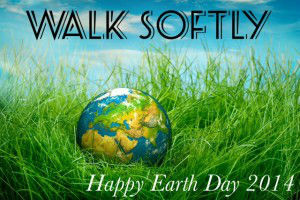
“On my 70th birthday I was asked: What are Mankind’s prospects? My reply: We are behaving like yeasts in a brewer’s vat, multiplying mindlessly while greedily consuming the substance of a finite world. If we continue to imitate the yeasts we will perish as they perish, having exhausted our resources and poisoned ourselves in the lethal brew of our own wastes. Unlike yeasts, we have a choice. What will it be?” – Farley Mowat – Author, Social Activist
When we walk softly, in concert with all living things – animal, plant and human – showing respect and understanding, the earth yields, it provides, and it sustains.
However, when we carry a big stick and prod the earth, stir the ocean and knock down everything in our path, the earth, damaged by our pursuit for more, labors under the pressure, and all suffer – animal, plant and human.
Here are some facts that you may not know:
- Americans make up only 5 percent of the earth’s population, but use 20 percent of the world’s energy.
- We consume 15 percent of the world’s meat.
- We produce 40 percent of the world’s garbage.
- In fact, if everyone lived like we do in the United States, we would need 4.1 earths to sustain the population.
You may not think that making changes in your home can have an impact on our suffering earth, but it can. Here are five ways that you can start walking softly today.
Conserve water: Researchers note that as the demand for clean water increases, so does water pollution. Keep water conservation in the forefront of your mind as you go about your day. Fix leaky sinks and toilets, wash your clothes and run your dishwasher only when you have a full load and keep your showers short and sweet.
Rethink your commute: If you figure out a different way to get to work two days a week, such as biking, walking or taking public transportation, you will reduce greenhouse gas emissions by about 1590 pounds per year. Try to do all your errands at one time and be cognizant of needless trips out.
Shop local: Buying as much food as you can locally helps the environment. It decreases the use of packages, including foam and plastic trays and wraps, and cuts down on greenhouse gases used in production and transportation of food. In many cases, it takes more energy to transport food than the food provides.
The Organic Consumers Organization gives the example of a head of lettuce produced in Salina Valley California that travels some 3,000 miles to Washington, D.C. The transportation requires 36 times as much fossil fuel energy as the food itself produces when it arrives in Washington.
Recycle: Imagine this: if an office building containing 7,000 people recycled paper products yearly, it would be equal to taking 400 cars off of the road. Get familiar with your local recycling policy and learn how to reuse or give new purpose to old items you may otherwise throw away.
Go solar: Going solar can be done one baby step at at time. If you are not up for a complete unplug from the grid, just get a few small solar chargers for such things as your computers and televisions. These chargers are well worth the money, and can be used for a number of small appliances as well.
If you are building a new home, consider installing a solar system. The average homeowner who invests in solar panels can save between 20 and 30 thousand dollars over the course of twenty years.
If you can’t afford the initial down payment for solar panels, consider leasing the system, which can save an average of 600 dollars each year depending on the size of your home.

Happy Earth Day 2014, we hope that you will make the time to walk softly upon the earth!
– The Alternative Daily
Sources:
http://epa.gov/epawaste/conserve/tools/warm/index.html

